Types of Water Heaters: Which is Best Choice for Your Murfreesboro Home?
Selecting the right water heater can feel like a daunting task. With such a wide range of options available, such as traditional tanks, solar units, and tankless models, each with their own energy efficiency and hot water capacity, it's essential to make an informed decision based on your family's specific needs. To help you make the best choice, our comprehensive guide offers a detailed review of each type of water heater. By reading further, you'll gain a thorough understanding of the advantages and disadvantages of each option. With this knowledge, you can confidently choose the perfect water heater for your home.

Traditional Storage Tank Water Heaters
Tank-style water heaters are a top pick among homeowners. These efficient appliances are designed to heat and store water in insulated tanks, ensuring a steady supply of hot water. Available in gas, electric, or oil options, tank-style water heaters are versatile and can be tailored to suit your specific needs. With just a simple turn of the tap, you'll have hot water at your disposal, conveniently and reliably.
Pros:
Not only are these types of water heaters more affordable upfront, but they also offer excellent value for your money.
They often come with longer warranty periods, providing added protection and peace of mind.
Maintenance is usually simple and doesn't involve complicated procedure
Cons:
Traditional water heaters have a reputation for being less energy-efficient, leading to increased operating expenses in the long run.
The size of the tank directly impacts the quantity of hot water that can be stored and used, resulting in potential shortages during high demand periods
Water damage is a constant concern when it comes to tanks that may develop leaks or fail.

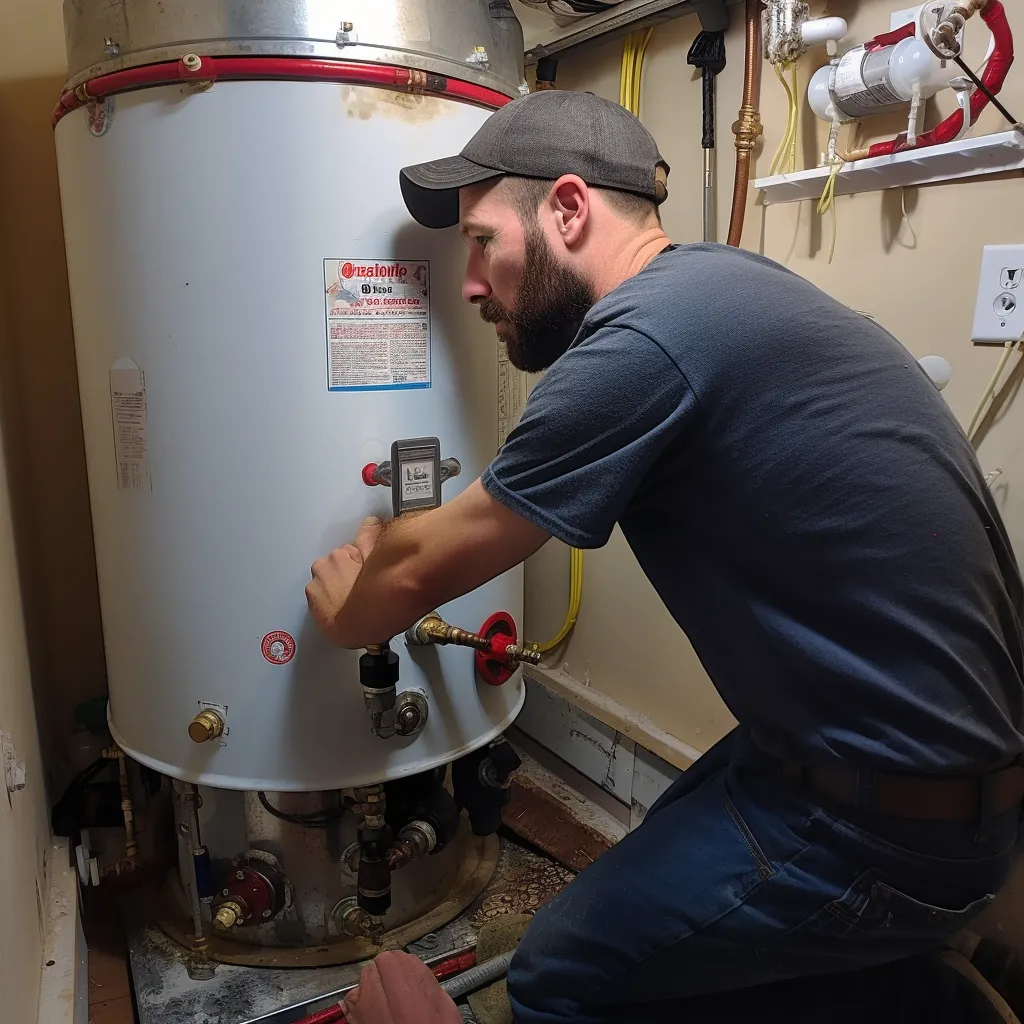
Tankless Water Heaters
Unlike traditional tank water heaters, tankless water heaters do not store hot water. Instead, they heat water directly as it passes through the unit. This on-demand heating system allows for continuous hot water supply, eliminating the need to wait for a storage tank to heat up.
Pros:
A key feature is easy installation because of their compact design.
These high energy-efficient water heaters offer a notable advantage: consistently low monthly bills.
Continuous hot water supply: You won't run out of hot water as long as there is demand.
Tankless water heaters have a longer lifespan, making them a savvy and cost-effective investment for homeowners.
Cons:
The initial cost of tankless water heaters is typically higher than that of traditional water heaters.
Venting complexities in small spaces.
Limited capacity for high-demand applications.
Heat Pump Water Heaters
Heat pump water heaters are a top choice. These water heaters are known for their high efficiency and cost-effectiveness in heating water. By using a small compressor to extract heat from the air, they are able to provide hot water while using a minimal amount of energy. This not only saves you money on your energy bills but also reduces your carbon footprint.
Pros:
Heat pump water heaters offer high energy efficiency, leading to potential savings on your monthly utility bills when compared to traditional water heaters.
These environmentally friendly water heaters harness renewable energy from the air, making them a highly sustainable choice.
Heat pump water heaters are equipped with a backup power source that allows them to continue operating even when the electricity goes out.
Cons:
Heat pump water heaters generally have a higher upfront cost compared to traditional water heaters.
It is crucial to ensure that there is adequate ventilation for proper installation and operation of heat pump water heaters. This means that additional space may be needed to allow for proper airflow and ventilation.
Heat pump water heaters might have a restricted capacity, leading to a reduced availability of hot water per usage.

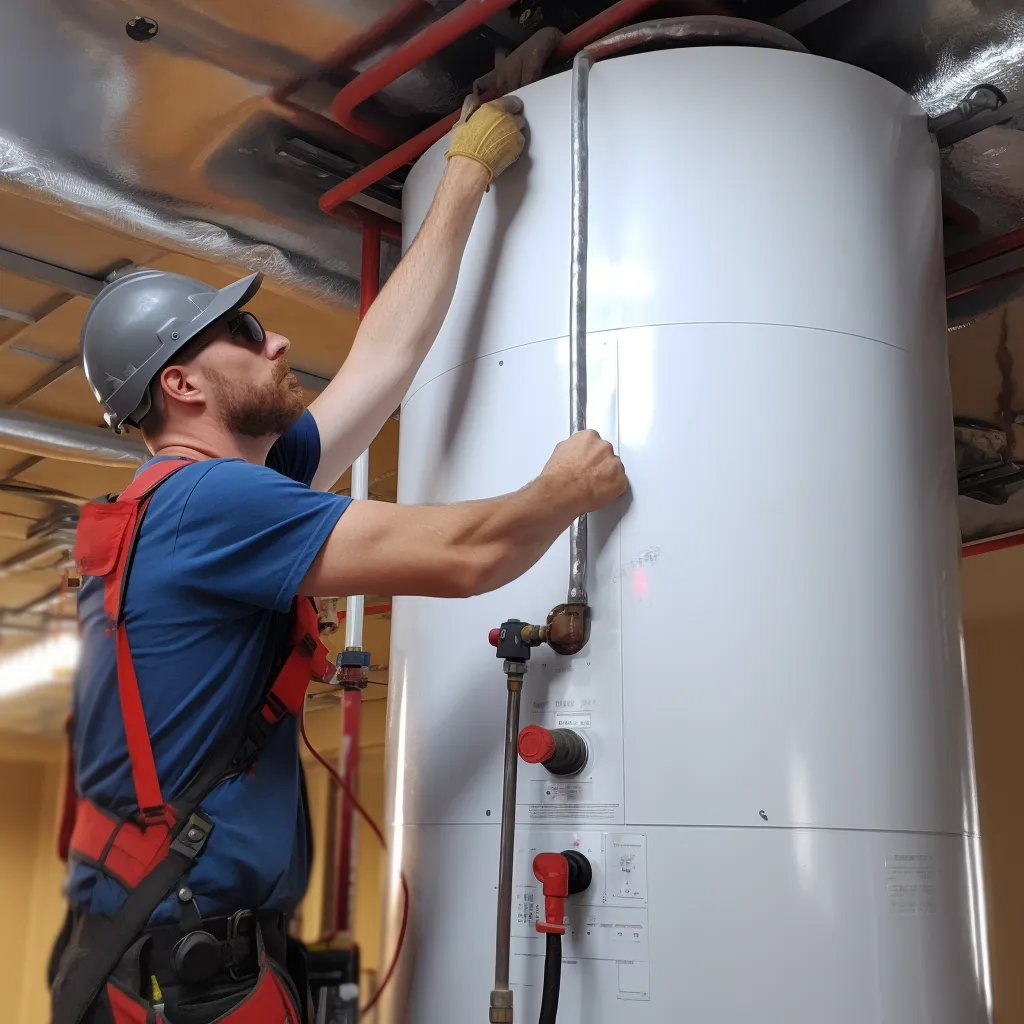
Heat Pump Hybrid Water Heaters
These innovative systems combine the best features of traditional storage tank water heaters and heat pump technology. By doing so, they offer improved efficiency and lower operating costs, making them an excellent choice for those looking to save on energy expenses.
Pros:
With their increased energy efficiency, homeowners can benefit from substantial savings on their utility bills.
Renewable energy utilization for sustainability..
Hot water availability during power outages.
Longer lifespan compared to traditional storage tank heaters.
Cons:
Heat pump hybrid water heaters have a higher initial cost compared to conventional storage water heaters.
Potential ventilation and space requirements that may lead to installation challenges.
Limited capacity means there is only a certain amount of hot water that can be used at a given time.
There is a potential risk of water damage in the event of a tank failure or leakage.
Solar Powered Water Heaters
Are you looking for an effective way to lower your monthly utility bills while also embracing renewable energy? Consider switching to a solar-powered water heater. With two main types available - active and passive systems - these water heaters utilize the sun's energy to heat stored water, providing a straightforward and budget-friendly solution. By opting for a solar-powered water heater, not only will you save money on your energy costs, but you'll also be contributing to a more sustainable and eco-friendly approach to water heating. Take a step towards a greener future with a solar-powered water heater. Get started with water heater replacement in Murfreesboro.

Active Systems:
One of the key advantages of active solar-powered water heaters is their exceptional efficiency. These systems are designed to optimize the collection of solar energy, harnessing the power of the sun to heat your water. As a result, you can enjoy ample hot water supply while significantly reducing your energy expenses. Additionally, active systems are known for their ability to generate significant amounts of hot water. With a well-designed and properly installed active solar-powered water heater, you won't have to worry about running out of hot water, even during peak usage times. This ensures that your household can enjoy the comfort and convenience of hot water whenever it is needed.
Passive Systems:
Passive solar-powered water heaters use solar power to heat water by relying on natural convection to transport heated fluid from the collectors to a storage tank. With their low installation and maintenance costs, passive solar water heaters offer an affordable alternative to traditional heating methods. Although they may not produce as much hot water as active systems, these systems effectively harness solar energy and provide an eco-friendly solution for water heater replacement in Murfreesboro.
Pros:
Their high efficiency results in a cost savings on energy bills.
Utilization of renewable energy from the sun.}
Longer lifespan compared to traditional water heaters.
Cons:
Higher initial cost compared to traditional storage tank heaters.
Additional space and equipment requirements may complicate installation.
With solar panels, there is the potential risk of water damage in the event that they become faulty or damaged. If water manages to penetrate the panels, it can potentially cause significant harm to the electrical components, leading to a complete breakdown.
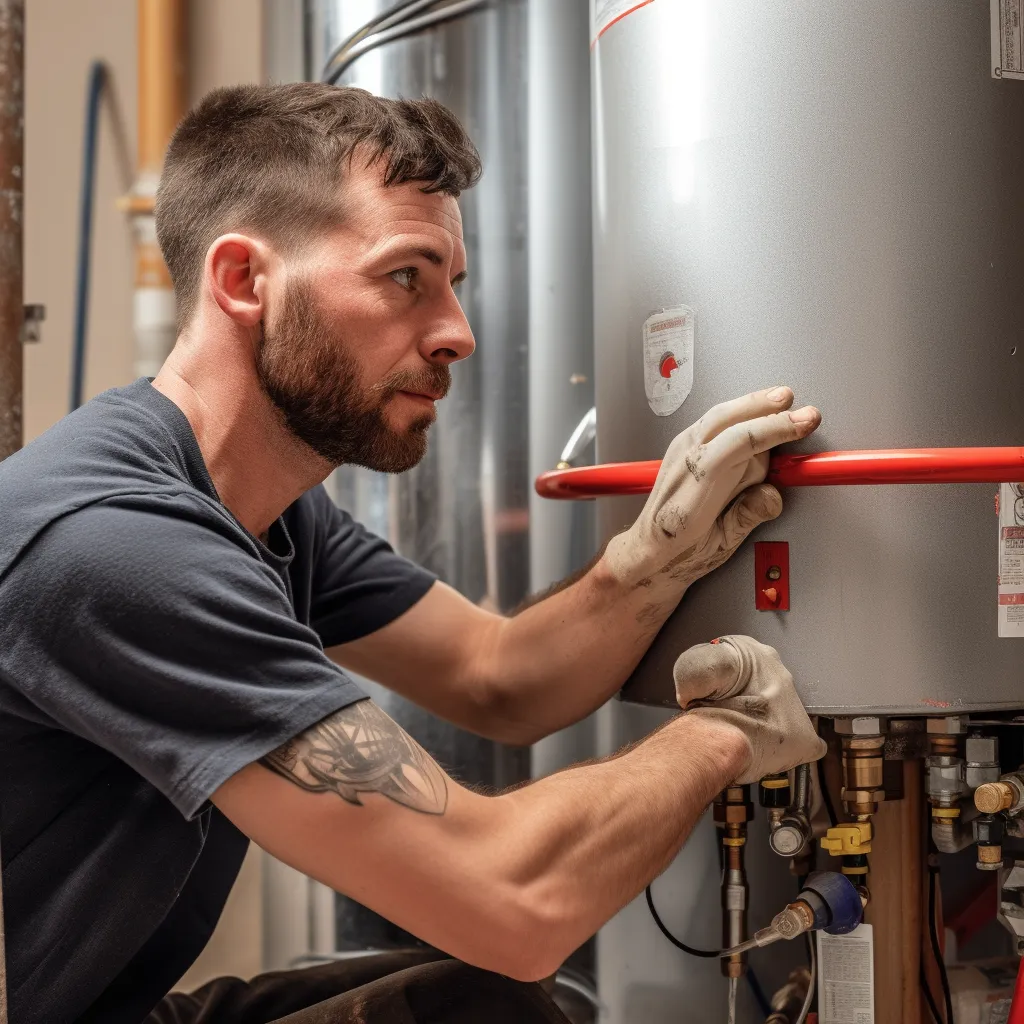

Point-of-Use Water Heaters
Compact and efficient point-of-use water heater systems offer convenient hot water on demand, making them ideal for small spaces or as an alternative to traditional storage tanks. By eliminating the need for long pipe runs, point-of-use water heaters minimize heat loss and avoid associated costs and inefficiencies.
Pros:
High energy efficiency, resulting in lower monthly utility expenses.
The compact size of our product ensures effortless installation and hassle-free maintenance even in limited spaces.
Longer lifespan compared to storage tank heaters.
Cons:
Higher initial cost and potential need for extra ventilation and installation space.
Reduced hot water capacity can result in a restricted amount of hot water available for each use.
Higher risk of water damage due to tank failure or leaks.
Water Heaters With Hydronic Boilers
Water heaters with hydronic boilers are known for their high efficiency and use water instead of air to circulate heat throughout your space. They are capable of providing both hot water for domestic use and space heating, making them an excellent choice for colder climates. Moreover, hydronic boilers can be paired with tank water heaters to ensure affordable hot water supply.
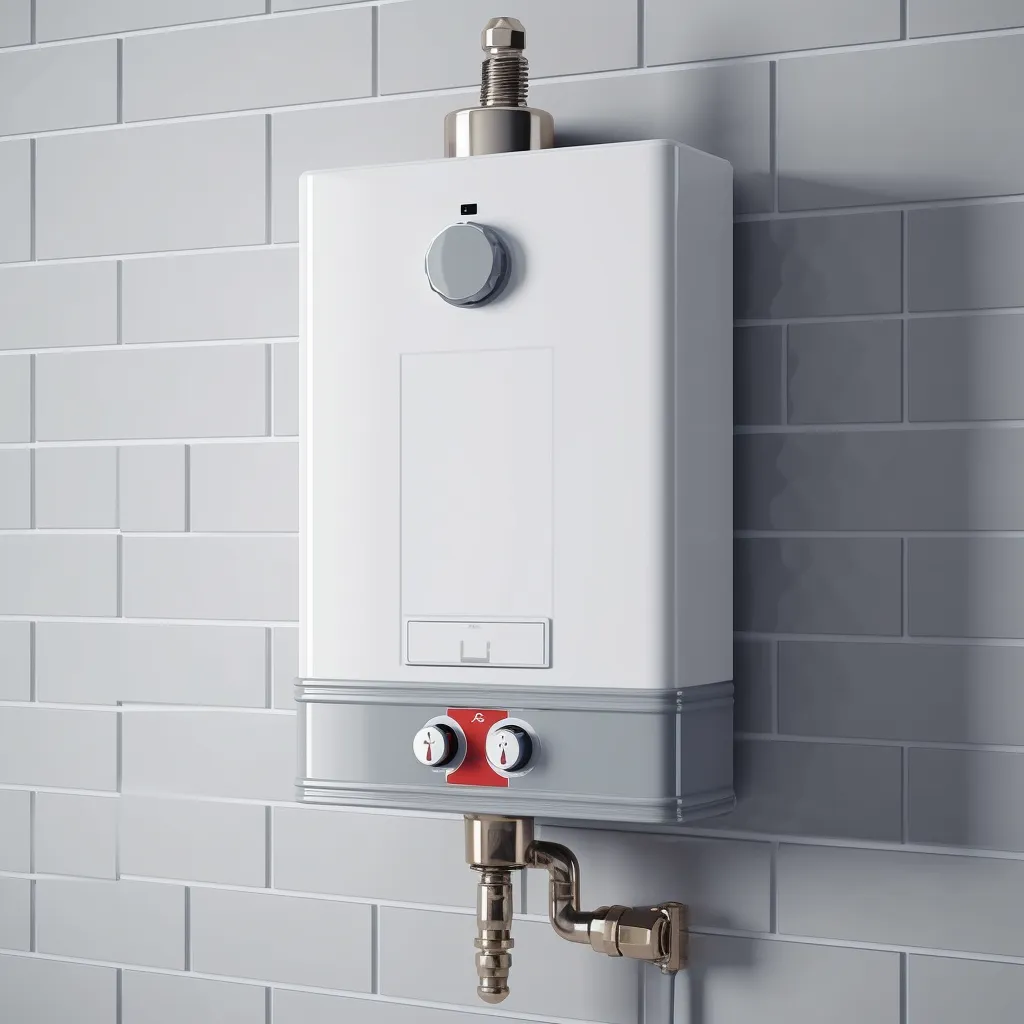
Pros:
Higher energy efficiency, meaning in reduced monthly expenses on utility bills.
This energy-efficient system provides the dual benefit of space heating and domestic hot water.
Compact design for easy installation in tight spaces.
Longer life expectancy compared to traditional tank water heaters.
Cons:
Initial costs higher compared to traditional storage models.
The limited capacity of this hot water system means that it can provide less hot water for each use.
Possibility of noise generation during operation.
There is a possibility that you may be ineligible for specific utility rebates or incentives.
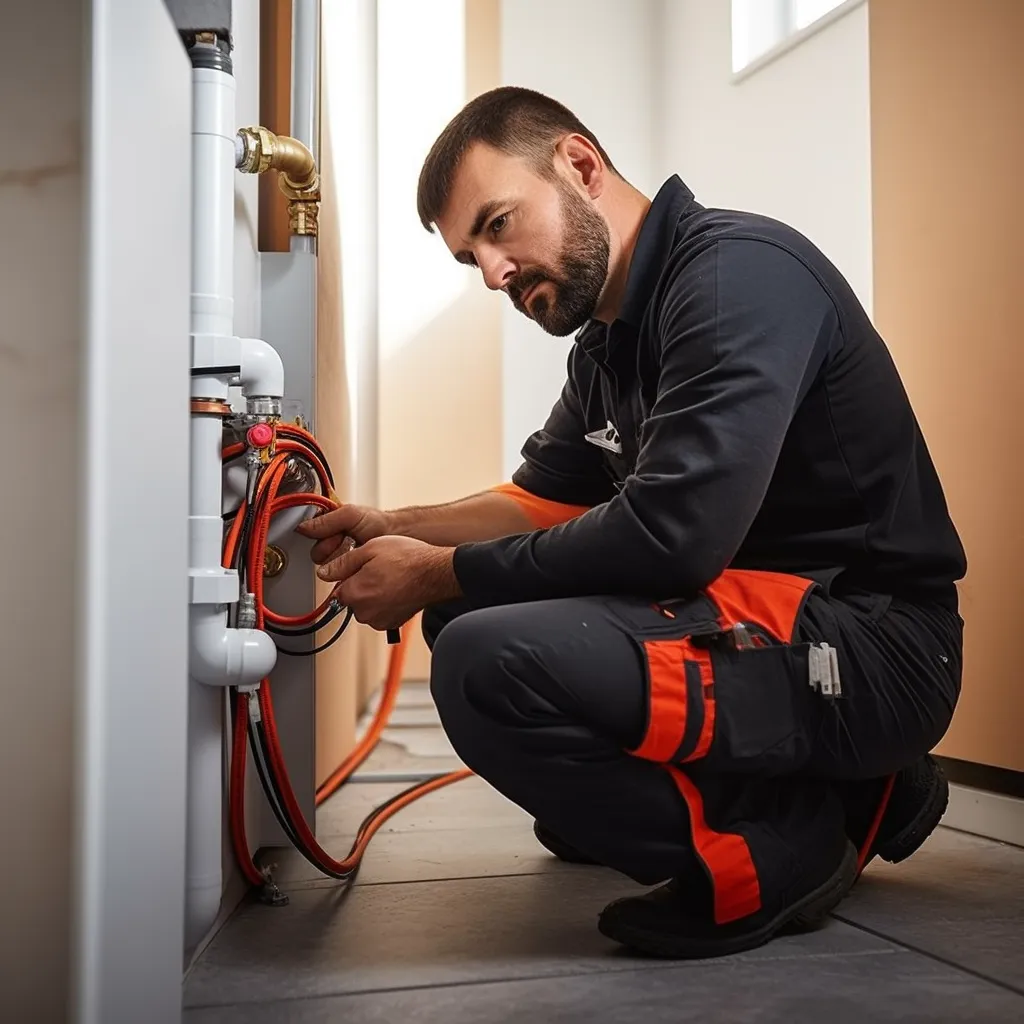

Smart Water Heaters
Smart water heaters use advanced technology to efficiently produce hot water. One notable feature of smart water heaters is their Wi-Fi enabled thermostats, allowing you to conveniently manage your hot water consumption and expenses from anywhere. With just a few taps on your smartphone, you can take control of temperature settings and customize them to suit your specific needs.
Pros:
With the convenience of remote control through a Wi-Fi enabled thermostat, homeowners can easily manage their water heater from their smartphones or other devices.
Energy-saving modes, such as vacation mode, optimize energy usage and minimize waste.
The compact size allows for effortless installation and maintenance, especially in areas with limited space.
Longer life expectancy compared to traditional storage tank heaters.
Cons:
Higher cost compared to traditional storage water heaters.
Certain utility rebates or incentives may not be applicable in all cases.
In order to ensure compatibility with newer devices, it may be necessary to implement additional software updates.
Potential security risks if the Wi-Fi connection is not secure

Condensing Water Heaters
Unlike traditional water heaters, condensing water heaters utilize advanced technology to capture and utilize heat that would typically be lost during the heating process. This means that condensing water heaters can use less fuel or electricity to produce hot water, resulting in significant energy savings.
Pros:
High energy efficiency, resulting in lower utility bills.
Longer lifespan compared to traditional tank water heaters.
Hot water availability during power outages.
Cons:
Higher initial cost.
Space and ventilation requirements.
Limited hot water capacity can be a frustrating issue for many households.

Choosing the right water heater for your home
When it comes to choosing the right water heater for your home, there are a few factors to consider:
One of the first things you need to determine is the size of the water heater you will need. This will depend on the number of people in your household and your daily hot water usage.
Next, you'll want to decide on the type of water heater that best suits your needs. There are three main types to choose from: conventional tank water heaters, tankless water heaters, and heat pump water heaters.
Once you have determined the size and type of water heater you need, it's time to consider the energy efficiency ratings. Look for a water heater with a high Energy Factor (EF) rating, as this indicates higher energy efficiency and lower operating costs.
Consider the warranty and lifespan of the water heater. A longer warranty period can provide you with peace of mind, and a longer lifespan will save you money on replacement costs in the future.
It's important to hire a professional for water heater installation. They can ensure that the unit is properly installed and connected to your home's plumbing system, maximizing its efficiency and safety.

When should you replace your water heater?
If you are experiencing issues with your water heater, it may be time to consider water heater replacement. There are specific indicators that can help you determine if it's time for a replacement.
One sign to watch out for is a decrease in hot water supply. If you're finding that your showers are becoming colder quicker, or you're running out of hot water faster than usual, your water heater might be struggling to keep up with demand.
Another indication is the age of your water heater. Most traditional tank-style water heaters have a lifespan of about 8 to 12 years. If your water heater is reaching or exceeding this age range, it's a good idea to start thinking about a replacement, even if it's not showing any visible issues yet.
A leaking water heater is also a cause for concern. If you notice pooling water around your water heater or see signs of corrosion or rust, it's important to address the issue promptly. Leaks can worsen over time and potentially cause significant damage to your home.
If you're frequently dealing with repairs and your water heater is no longer reliable, it might be more cost-effective to replace it altogether. Constantly investing in repairs can add up quickly, making a replacement a more practical solution in the long run.
When facing any of these signs, it's recommended to consult with professional water heater replacement services in Murfreesboro. They can assess your specific situation, recommend the most suitable replacement options, and ensure proper installation, ensuring a reliable and efficient supply of hot water in your home.
Maintenance tips for water heater efficiency
Water heaters play a crucial role in providing warm water for various household activities. However, over time, they can become less efficient, resulting in reduced performance and increased energy consumption. To ensure optimal functioning of your water heater and to save on energy costs, consider following these maintenance tips for water heater efficiency:
Regular Inspections: Periodically inspect your water heater for any signs of leaks, corrosion, or damage. Look for water pooling around the unit or rusting on the tank. Promptly addressing these issues can prevent major problems down the line.
Temperature Check: Adjust the temperature of your water heater to an appropriate level. The recommended temperature is typically around 120 degrees Fahrenheit for energy-efficiency and to prevent scalding accidents. Refer to your user manual for specific instructions on adjusting the temperature.
Maintain Clearance: Ensure that your water heater has proper clearance from nearby objects, such as boxes, debris, or other flammable materials. This allows for proper airflow and minimizes the risk of fire hazards.
Flush the Tank: Sediment buildup inside the tank can reduce the efficiency of your water heater. Flushing the tank once or twice a year can remove these sediments, improving performance. Follow the manufacturer's instructions or seek professional assistance for this task.
Insulate Exposed Pipes: Insulating hot water pipes can help prevent heat loss during transportation, allowing hot water to reach faucets faster and reducing energy waste.
Test the Pressure Relief Valve: The pressure relief valve releases excess pressure from the tank. Test it annually by lifting the valve's lever slightly and letting it snap back. If it doesn't release water or if it leaks afterward, contact a professional for inspection and repair.
Maintain Air Vents: For gas-powered water heaters, ensure that the air vents at the bottom of the unit are clear and free from obstructions. This allows for proper combustion and ventilation, reducing the risk of carbon monoxide buildup.
Schedule Professional Maintenance: Consider hiring a professional plumber to perform regular maintenance on your water heater. They can inspect all components, clean the burner assembly (if applicable), and troubleshoot any potential issues.
Benefits of hiring a licensed plumber to replace your water heater
When it comes to replacing your water heater, it's essential to hire a licensed plumber. Benefits of hiring a professional include.
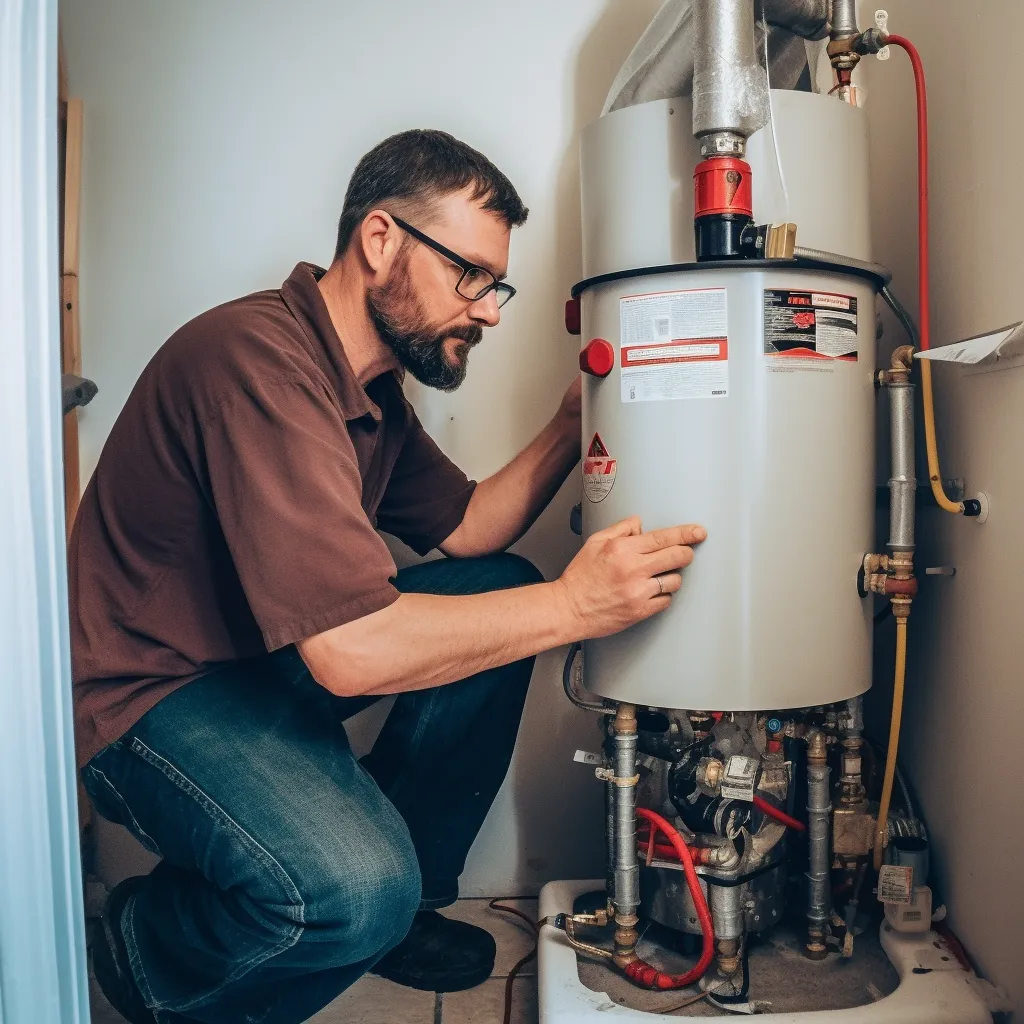
Expertise and Knowledge: Licensed plumbers have undergone rigorous training and possess the necessary knowledge and expertise to handle water heater replacements. They are well-versed in various types of water heaters and can recommend the best options for your specific needs.
Safety: When dealing with water heaters, safety should be a top priority. Licensed plumbers adhere to strict safety protocols and regulations. They can navigate potentially hazardous situations, such as gas leaks or electrical issues, ensuring that the replacement process is carried out safely.
Quality Workmanship: A licensed plumber will provide you with high-quality workmanship. They have the skill set to carry out water heater replacements efficiently and accurately, ensuring that the installation is done correctly the first time. This helps to prevent future issues and extends the lifespan of your new water heater.
Warranty Protection: Many water heaters come with warranties, which can be voided if installed incorrectly. Hiring a licensed plumber guarantees that the replacement is done according to manufacturer specifications, preserving your warranty and providing additional protection in case of any defects or malfunctions.
Time and Cost Savings: While it may be tempting to try a DIY water heater replacement, it often leads to costly mistakes and time-consuming setbacks. By hiring a licensed plumber, you can save yourself the hassle and potential additional expenses associated with incorrect installations or repairs.
Code Compliance: Local building codes and regulations must be followed when replacing a water heater. Licensed plumbers stay up-to-date with these codes and ensure that your water heater replacement meets all necessary requirements. This gives you peace of mind knowing that your installation is compliant with local laws.
Hiring a licensed plumber in Murfreesboro, for your water heater replacement offers numerous benefits. From their expertise and knowledge to ensuring safety, providing quality workmanship, preserving warranties, saving time and costs, and complying with local codes, a licensed plumber is the best choice for a hassle-free and efficient water heater replacement.
Contact Us
GET IN FULL TOUCH
PHONE: 615-671-4918
EMAIL:
steven@waterheatermurfreesboro.com
Rutherford Plumbing Heating & Cooling
Murfreesboro, TN 37128
